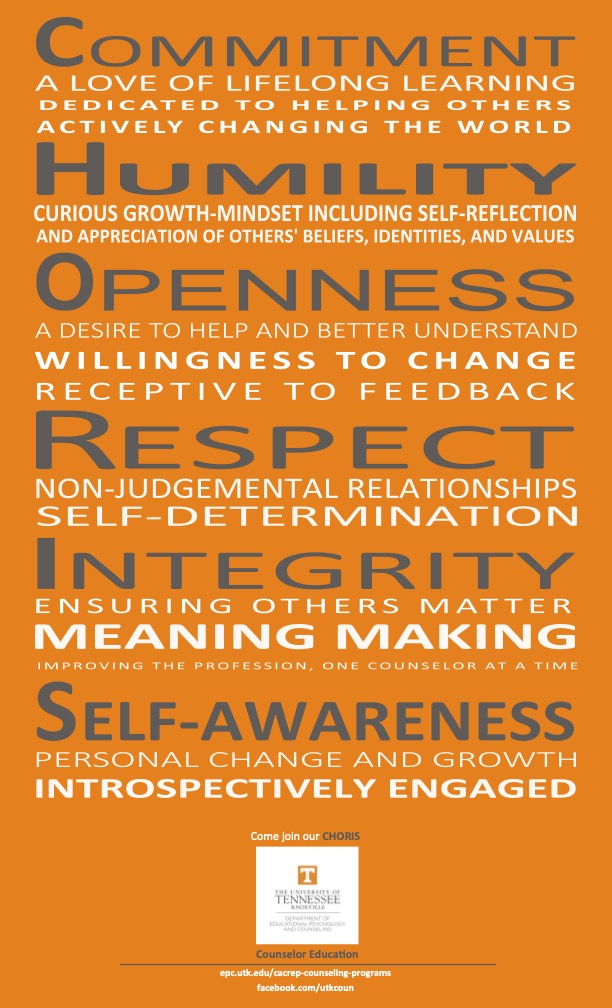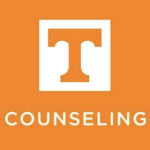The Clinical Mental Health Counseling (CMHC) program, a 60-hour program, is accredited by the Council for the Accreditation of Counseling and Related Educational Programs (CACREP), and meets educational requirements for licensure as a professional counselor in Tennessee and many other states. Our program is offered in a face-to-face format in Knoxville, TN. Most students enroll on a full-time basis; part-time options are available by advisement. Most courses are offered during the day, Monday-Thursday.
Please Note: The GRE is not required for applicants to the Clinical Mental Health Counseling program.
The program prepares professionals to use strong professional identity and relationship skills across diverse counseling settings including community agencies, nonprofits, and private practice. Our program includes a special focus on work with at-risk children and youth. Throughout our program, we work to embrace our core values–Commitment, Humility, Openness, Respect, Integrity, and Self-Awareness–and to attend to culturally sensitive, developmentally appropriate, and ethical relationships.
About Clinical Mental Health Counseling
Mission
We aim to make the world a better place for persons in need through educating excellent counselor-scholars. Our graduates excel in providing healing therapeutic relationships, optimally efficient and effective counseling services, and leading our field to better help persons in need through their work in clinical mental health counseling settings and beyond.
Objectives
- Graduates will have foundation knowledge necessary for success as professional counselors
- Graduates will be able to develop therapeutic relationships that are deeply healing, culturally sensitive, developmentally appropriate, and ethical.
- Graduates will demonstrate professional dispositions including Commitment, Openness, Respect, Integrity, and Self-Awareness.
- Graduates will be culturally sensitive and ethical advocates for self, clients, and profession through counseling interventions, programming, and professional and community engagement.
- Graduates will be well-skilled in the full range of tasks needed for clinical mental health counseling including interventions for prevention and treatment of a broad range of mental health issues; roles of mental health counselors; and settings and service delivery models.
Core CACREP-Accredited Program Faculty

Casey A. Barrio Minton*
Department Head
Professor
cbarrio@utk.edu
865-974-8382
Jeff L. Cochran*
Professor
jcochr11@utk.edu
865-974-4178
Jamian Coleman, PhD*
Assistant Professor
jcolem73@utk.edu
865-974-0734
Joel F. Diambra*
Associate Professor
jdiambra@utk.edu
865-974-8774
Melinda M. Gibbons*
Professor
mgibbon2@utk.edu
865-974-4477
Hyunhee Kim, PhD*
Assistant Professor
hkim103@utk.edu
865-974-5487
Jordan Westcott, PhD*
Assistant Professor
jwestco1@utk.edu
865-974-3845
*Designated as core faculty members for this program.[/half]
Our faculty and student embrace a strong counselor-first identity. This includes ongoing engagement in the following professional associations:
- American Counseling Association
- Chi Sigma Iota International
- Tennessee Counseling Association
- Tennessee Licensed Professional Counselors Association
In addition, a number of our faculty members and students have held leadership positions in the following associations
- Association for Assessment & Research in Counseling
- Association for Counselor Education & Supervision
- Association for Death Education & Counseling
- Association for Humanistic Counseling
- American Mental Health Counselors Association
- American School Counselor Association
- National Career Development Association
- Southern Association for Counselor Education & Supervision
Information for Potential Applicants
The program admits students to begin during the Summer (June) semester only. The next round of applications will be due December 1, 2024 to begin in Summer 2025.
We have linked FAQs about the program and application process on the next page. You can also use the link on the next page to reserve a space in a program information session.
Please direct admission or application inquiries to COUNADMIT@utk.edu
All students complete a one-semester, 100-hour practicum where they work on developing counseling relationships. After practicum, all students complete a two-semester, 600-hour internships. During internship, students focus on developing counseling relationships and assuming responsibilities of an entry-level professional counselor. Practicum and internship sites are carefully selected in collaboration with the program faculty.
Licensure
All 50 states require a license to practice as a professional counselor. These licensure requirements tend to feature the three Es: education, examination, and experience (2000-4000 supervised hours post-graduation). You can learn more on the American Counseling Association’s licensure requirements page.
Our CMHC program is designed to exceed the educational requirements for licensure as a professional counselor with mental health service provider designation (LPC-MHSP) in the state of Tennessee. In addition, accreditation by the Council for the Accreditation of Counseling and Related Educational Programs (CACREP) helps ensure a smooth path to licensure in many other states. If you plan to practice in a state other than Tennessee, a faculty advisor can help you customize electives to meet educational requirements.
National Certification
As a CACREP accredited program, our program is able to offer a fast-track to the National Certified Counselor Credential offered by the National Board for Certified Counselors (NBCC).
Students admitted to the MS degree have the opportunity to complete all educational and field experience requirements for Clinical Mental Health Counseling and School Counseling. Although the dual option does not require additional credit hours, the program must be completed over three years to allow one year of internship in School Counseling and one year of internship in CMHC. Students may apply for the dual option in their first semester of study.
Unfortunately, the department is unable to provide graduate assistantships for MS students. However, other assistantships are available on campus. See the Graduate School’s Costs and Funding page for more information.
Includes EPC GA Application form, departmental fellowships/scholarships, and links to other funding sources around UT Knoxville.
The Counselor Training Clinic provides students with access to free individual and group counseling and is focused on helping students to achieve a greater sense of wellness. Students collaborate with counselors to create and achieve personal goals to increase their physical, mental, and emotional well-being.
CACREP Accreditation Information
Updated 10/27/23







